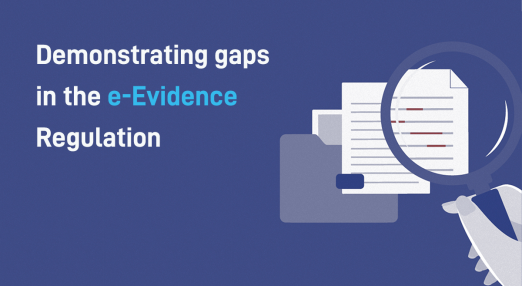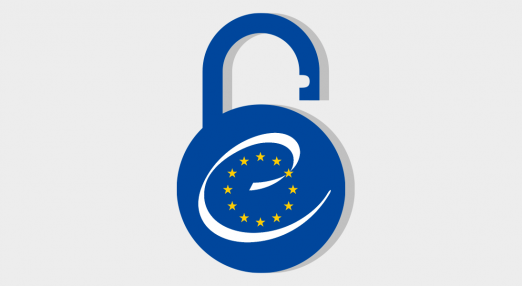Open letter: e-Evidence package lacks appropriate safeguards, EU Parliament must reject it
Civil society, doctors, lawyers and journalists associations and internet service providers are calling on MEPs to reject the so-called “e-Evidence” package during the plenary vote on June 13 because the proposed system of cross-border access to data in criminal matters would severely undermine fundamental rights.
Filter resources
-

Open letter: e-Evidence package lacks appropriate safeguards, EU Parliament must reject it
Civil society, doctors, lawyers and journalists associations and internet service providers are calling on MEPs to reject the so-called “e-Evidence” package during the plenary vote on June 13 because the proposed system of cross-border access to data in criminal matters would severely undermine fundamental rights.
Read more
-

2023: Important consultations for your Digital Rights!
Public consultations are an opportunity to influence future legislation at an early stage, in the European Union and beyond. They are your opportunity to help shaping a brighter future for digital rights, such as your right to a private life, data protection, or your freedom of opinion and expression.
Read more
-

e-Evidence compromise blows a hole in fundamental rights safeguards
In December 2022, the Council and the European Parliament agreed on a final compromise text on the so-called ‘e-Evidence’ proposals. With major concessions given to the Member States’ position, the results of these trilogues negotiations are of bad omen for people’s rights and freedoms.
Read more
-

“e-Evidence” trilogues: what’s left of fundamental rights safeguards?
In an open letter addressed to policymakers, an EDRi-led coalition of digital rights, lawyers, journalists, media organisations and internet service providers associations are ringing the alarm bell. We warn against the foreseen framework that could seriously endanger freedom of expression, privacy rights and the right to a fair trial.
Read more
-

“E-evidence” negotiations: European Parliament must stand its grounds
The European Parliament and the Council have tremendous difficulties to agree on the issue of cross-border access to data by national law enforcement authorities. While the Parliament is trying to maintain as many fundamental rights safeguards as possible in the so-called “e-evidence” Regulation, the Council is stubbornly sticking to its position. If the Council’s vision overrides the Parliament, the legislation would seriously threaten free speech, privacy rights and the right to a fair trial. A coalition of digital rights, lawyers, journalists, media organisations and internet service providers associations are calling on the Council to show a greater spirit of cooperation and urge the Parliament to not excessively deviate from its original position.
Read more
-

E-evidence regulation: Why it matters for medical confidentiality?
Access to health data by foreign authorities in the context of a criminal investigation – be it intentional or not – needs to be carefully regulated as it also impacts doctors’ legal and ethical duties.
Read more
-

2022: Important consultations for your Digital Rights!
Public consultations are an opportunity to influence future legislation at an early stage, in the European Union and beyond. They are your opportunity to help shaping a brighter future for digital rights, such as your right to a private life, data protection, or your freedom of opinion and expression.
Read more
-

Booklet: Demonstrating gaps in the e-Evidence Regulation
The Regulation on cross border access to data by law enforcement (so-called “e-Evidence” Regulation) threatens to put the rights of journalists, lawyers, doctors, social workers and individuals in general at great risk. EDRi and 13 civil rights organisations have just launched four scenarios that clearly depict how our future could enfold if the Regulation is approved.
Read more
-

“E-evidence” state of play: Building compromises, sweeping rights under the carpet
Despite the Pegasus scandal which has sent shock waves across Europe, and served to shine a light on illegal surveillance practices used by governments, the Council and the European Parliament are moving closer to an agreement on a new data-harvesting tool that could be similarly abused.
Read more
-

EFF to Council of Europe: Flawed Cross Border Police Surveillance Treaty Needs Fixing
EDRi member Electronic Frontier Foundations (EFF) has joined European Digital Rights (EDRi), the Samuelson-Glushko Canadian Internet Policy & Public Interest Clinic (CIPPIC), and other civil society organizations in recommending 20 solid, comprehensive steps to strengthen human rights protections in the new cross border surveillance draft treaty that is under review by the Parliamentary Assembly of the Council of Europe (PACE). The recommendations aim to ensure that the draft treaty, which grants broad, intrusive police powers to access user information in criminal cross border investigations, contains a robust baseline to safeguard privacy and data protection.
Read more
-

Council of Europe’s Actions Belie its Pledges to Involve Civil Society in Development of Cross Border Police Powers Treaty
As the Council of Europe’s flawed cross border surveillance treaty moves through its final phases of approval, time is running out to ensure cross-border investigations occur with robust privacy and human rights safeguards in place. The treaty’s drafting process has been deeply flawed, with civil society groups, defense attorneys, and even data protection regulators largely sidelined.
Read more
-

“E-evidence” negotiations: a call to protect media freedoms and democratic rights from abusive cross-border orders
Together with a coalition of 25 organisations and companies, European Digital Rights (EDRi) urges the European Parliament and the Council to uphold a high level of procedural safeguards in their negotiations on the so-called “e-evidence Regulation”.
Read more
